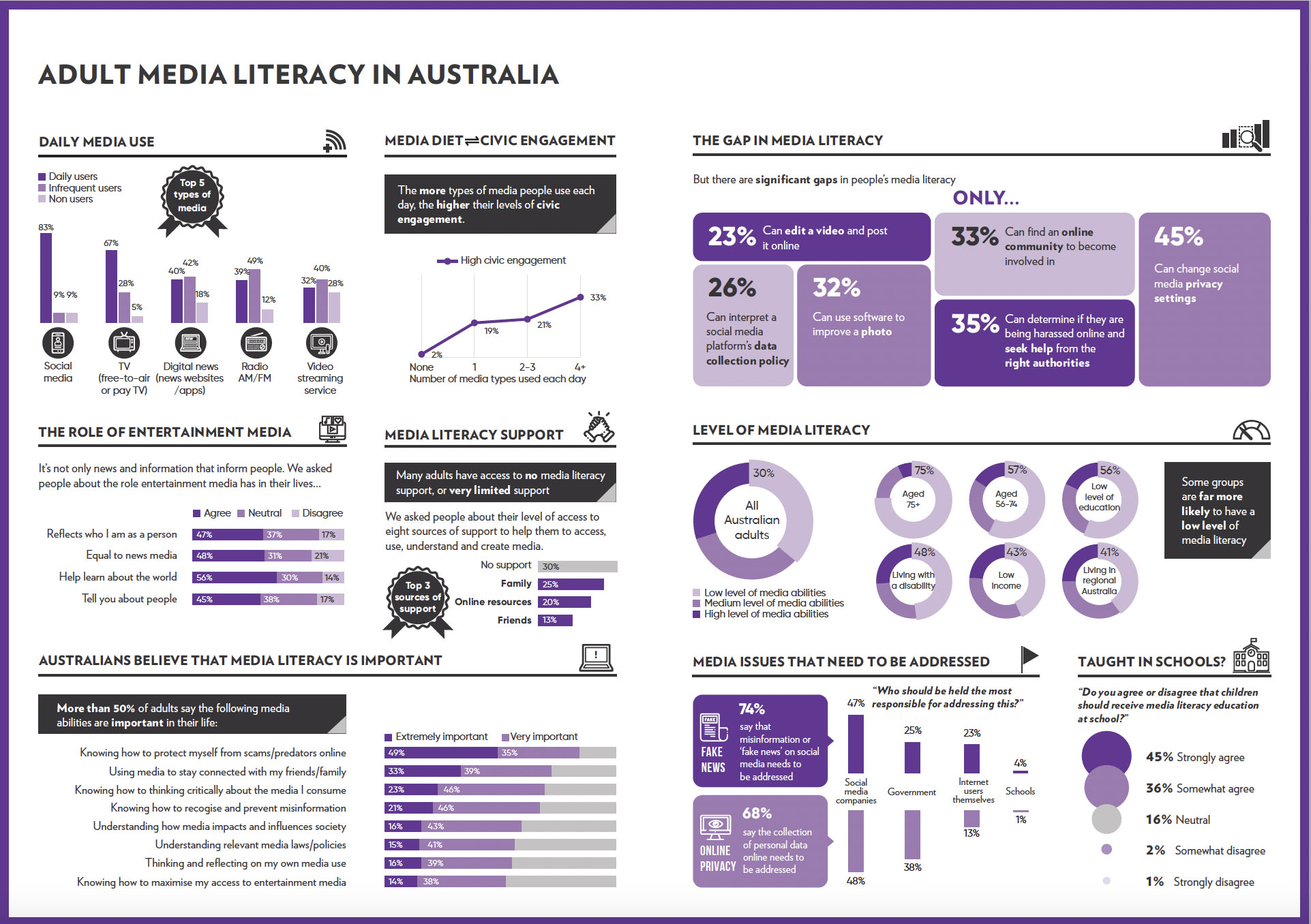Adult Media Literacy in Australia

COVID-19 is the first pandemic of the 21st century and the first of its kind to occur at a time when information technology and social media platforms are being used on a mass scale. The prevalence of conspiracy theories about the virus and vaccines during this period has led to mistrust in health authorities and risky behaviour. This experience has demonstrated the dangers of misinformation to society and put media literacy on the agenda of governments around the world, including Australia.
Media literacy is described as having the ability to critically engage with media and includes separating fact from fiction, deciding which digital technologies and platforms to use and which to avoid, and the ability to critique the power and influence media and technology companies have.
Until recently, not much was known about adult media literacy in Australia, as no nationally representative data existed in this field. Throughout 2020 and 2021, the Institute for Culture and Society (ICS) teamed up with the Australian Media Literacy Alliance (AMLA) (opens in a new window) for the Adult Media Literacy in Australia Project (opens in a new window) to examine the media knowledge and skills Australian citizens already have – and need – to fully participate in society.
Adult Media Literacy in Australia Project (opens in a new window) is the third phase of the Advancing Media Literacy in Australia project led by the ICS member Tanya Notley. The project analysed the media knowledge and skills Australian citizens already have – and need – to fully participate in society. The first two phases of the project focused on young Australians (aged 8-16 years), which called for an urgent need to support media literacy initiatives in and out of school.
The ICS and AMLA support a shared understanding of media literacy needs and challenges. Their collaboration provided the momentum for stakeholders to partner with AMLA to cultivate collective, effective, and evidence-based solutions, which points to the real-world impact that academic research can provide for industries.
Adult Media Literacy in Australia investigated adult media literacy levels, needs and gaps in the country by implementing a national survey with more than 3000 adults and carried out interviews with experts from 17 organisations. To have a better understanding of the diversity of media literacy needs among adult Australians, the researchers focused on four target groups: people who live in aged care facilities; people living with a disability; culturally and linguistically diverse (CALD) people; and Aboriginal and Torres Strait Islander people.
The project’s most recent report, Adult Media Literacy in Australia: Attitudes, Experiences and Needs (opens in a new window) was launched in 2021. The findings show that Australian adults use several different types of media each day and believe a diverse range of media activities are important in their lives. However, the survey results highlight the fact that Australian adult media literacy is low. It is reported that most adults lack confidence in their media abilities including in areas such as checking if information online is true or if its source can be trusted. Tanya Notley states that:
“A lack of media literacy will contribute to increasing levels of social, cultural and economic exclusion for individuals, families and groups. In addition, a lack of media literacy may exacerbate the potential for broader social divisions and threats to our democracy due to the influence of misinformation.” Read more here (opens in a new window)
The research informed a national consultation process designed to identify a pathway forward to advance the media literacy of all Australians. Six workshops were hosted, involving 121 people representing 89 organisations from every state and territory in Australia. This resulted in the report, Towards a National Strategy for Media Literacy (opens in a new window), which was presented to Federal Government in October 2021.
Prior to this project, the lack of data in this field prevented civil society organisations, public institutions, and governments from designing evidence-based responses to address needs and challenges. The qualitative and quantitative data cultivated by the researchers have been utilised by AMLA to design effective and evidence-based solutions.
This collaboration is evidence of ICS’s dedication to fostering impactful collaborations and generating real-world impact through research. Along with our partner AMLA, we will be building on this research and engagement to advocate for and deliver change, especially for those most at risk.
Adult Media Literacy in Australia: Attitudes, Experiences and Needs was co-authored by Tanya Notley, Simon Chambers, Sora Park, and Michael Dezuanni.
Partner with ICS
If you would like to collaborate with us or find out more about what we can offer you, please get in touch with our Senior Business Development Officer - Sally Byrnes - using the details below.
Email: S.Byrnes@westernsydney.edu.au
Phone: +61 421 320 441




